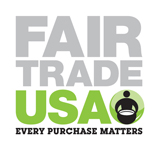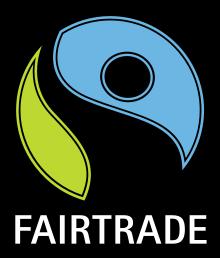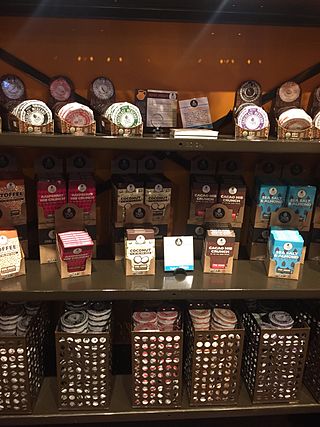Related Research Articles

Fair trade is a term for an arrangement designed to help producers in developing countries achieve sustainable and equitable trade relationships. The fair trade movement combines the payment of higher prices to exporters with improved social and environmental standards. The movement focuses in particular on commodities, or products that are typically exported from developing countries to developed countries but is also used in domestic markets, most notably for handicrafts, coffee, cocoa, wine, sugar, fruit, flowers and gold.

Fairtrade International, or Fairtrade Labelling Organizations International E.V. is a product-oriented multistakeholder group aimed at promoting the lives of farmers and workers through trade. Fairtrade's work is guided by a global strategy focused on ensuring that all farmers earn a living income, and agricultural workers earn a living wage. Fairtrade works with farmers and workers of more than 300 commodities. The main products promoted under the Fairtrade label are coffee, cocoa, banana, flowers, tea, and sugar.

The Fairtrade Foundation is a charity based in the United Kingdom that aims to help disadvantaged producers in developing countries by tackling injustice in conventional trade, in particular by promoting and licensing the Fairtrade Mark, a guarantee that products retailed in the UK have been produced in accordance with internationally agreed Fairtrade standards. The foundation is the British member of FLO International, which unites FLO-CERT, 25 National Fairtrade Organisations and 3 Producer Networks across Europe, Asia, Latin America, North America, Africa, Australia and New Zealand.
Matthew Algie is an independent coffee roaster with registered offices at 16 Lawmoor Road, Glasgow, United Kingdom. The company sells its coffee to coffee shops, bars, restaurants, hotels and businesses across the UK & Ireland and also offers coffee machines for hire - supported by a network of field engineers as well as a range of coffee-related equipment and complementary products through its sister-company Espresso Warehouse. Additionally, Matthew Algie also provide SCA accredited barista training courses, taught via their training campuses based in London, Glasgow & Dublin.
Cafédirect is a UK-based alternative trading organization.

The 'International Fairtrede Certification Mark is an independent certification mark used in over 69 countries. It appears on products as an independent guarantee that a product has been produced according to Fairtrade political standards.

Fair Trade USA, formerly "TransFair USA", is a 501(c)(3) non-profit organization that sets standards, certifies, and labels products that promote sustainable livelihoods for farmers and workers and protect the environment.

Fairtrade Canada, formerly TransFair Canada, is a national non-profit certification and public education organization promoting Fairtrade certified products in Canada to improve the livelihood of developing world farmers and workers. It is the Canadian member of FLO International, which unites 24 fair trade producer and certification initiatives across Europe, Asia, Latin America, North America, Africa, Australia and New Zealand.

Fairtrade Nederland formerly known as Max Havelaar StichtingArchived 2022-08-16 at the Wayback Machine is the Dutch member of Fairtrade International, which unites 23 Fairtrade certification producer and labelling initiatives across Europe, Asia, Latin America, North America, Africa, Australia and New Zealand.
The fair trade debate concerns the ethics and economic implications of fair trade, and alleged issues with the Fairtrade brand in particular.

UTZ, formerly called UTZ Certified, is a program and a label for sustainable farming. The organization was founded as a non-profit in the Netherlands in 2002. The UTZ label is featured on more than 10,000 product packages in over 116 countries. In 2014, UTZ was reported to be the largest program for sustainable farming of coffee and cocoa in the world. The UTZ program addresses agricultural practices, social and living conditions, farm management, and the environment. In January 2018, UTZ officially merged with the Rainforest Alliance in response to the increasing challenges of deforestation, climate change, systemic poverty, and social inequity.

Fair trade coffee is coffee that is certified as having been produced to fair trade standards by fair trade organizations, which create trading partnerships that are based on dialogue, transparency and respect, with the goal of achieving greater equity in international trade. These partnerships contribute to sustainable development by offering better trading conditions to coffee bean farmers. Fair trade organizations support producers and sustainable environmental farming practices and prohibit child labor or forced labor.
Third-wave coffee is a movement in coffee marketing emphasizing high quality. Beans are typically sourced from individual farms and are roasted more lightly to bring out their distinctive flavors. Though the term was coined in 1999, the approach originates in the 1970s, with roasters such as the Coffee Connection.

A fair trade certification is a product certification within the market-based movement fair trade. The most widely used fair trade certification is FLO International's, the International Fairtrade Certification Mark, used in Europe, Africa, Asia, Australia and New Zealand. Fair Trade Certified Mark is the North American equivalent of the International Fairtrade Certification Mark. As of January 2011, there were more than 1,000 companies certified by FLO International's certification and a further 1,000 or so certified by other ethical and fairtrade certification schemes around the world.
Sustainability standards and certifications are voluntary guidelines used by producers, manufacturers, traders, retailers, and service providers to demonstrate their commitment to good environmental, social, ethical, and food safety practices. There are over 400 such standards across the world.

Fair trade cocoa is an agricultural product harvested from a cocoa tree using a certified process which is followed by cocoa farmers, buyers, and chocolate manufacturers, and is designed to create sustainable incomes for farmers and their families. Companies that use fair trade certified cocoa to create products can advertise that they are contributing to social, economic, and environmental sustainability in agriculture.
Fairtrade bananas was a marketing initiative which focused on increasing the price paid to small banana growers and the wages of agricultural workers. This is not a commercial brand, but a marketing strategy. Fair trade is based on higher prices paid by consumers that allow an equitable distribution of gains from trade over the chain partners.

Taza Chocolate is a Mexican-inspired stoneground, organic chocolate manufacturer based in Somerville, Massachusetts, United States. The factory was founded by Alex Whitmore in 2005 and is home to over 40 different products that can be found in 2,800 retail stores across the country.

Counter Culture Coffee is a Durham, North Carolina based coffee roasting company founded in 1995. It has regional training locations in Asheville, NC; Atlanta; Boston; Charleston, SC; Chicago; Durham, NC; Emeryville, CA; New York City; Philadelphia; and Washington D.C. Counter Culture training centers provide education in the fundamentals of preparing and serving coffee and serve as classrooms and event spaces. Training centers are not only for vendors of Counter Culture Coffee, but are also available to anyone that is interested in the production of coffee. Training centers also host competition training, food events with guest chefs, and professional workshops.
Globalization of supply chains and pressure to lower production costs have negatively impacted environments and communities around the world, especially in developing nations where production of high demand goods is increasingly taking place. Since the 1990s, awareness of these negative impacts has grown, leading stakeholders to push companies to take responsibility and actively work to improve the sustainability of their supply chains. It has come to be understood that a company is only as sustainable as the start of its supply chain, bringing about the need for sustainable sourcing. Sustainable sourcing refers to the inclusion of social, environmental, and economic criteria in the sourcing process.
References
- ↑ Meehan, Peter (2007-09-12). "To Burundi and Beyond for Coffee's Holy Grail". The New York Times .
- ↑ "Direct Trade". Lexicon of Food. Retrieved 2017-07-04.
- ↑ "What is Direct Trade coffee?". www.ethicalcoffee.net. Retrieved 2017-07-04.
- ↑ "Contrasting Direct Trade and Fair Trade Coffee". Lexicon of Food. 2014-10-02. Retrieved 2017-07-04.
- ↑ "Transparent Trade Coffee". www.transparenttradecoffee.org. Retrieved 2017-07-04.
- ↑ "Learn & Do | Community | Direct Trade | Intelligentsia Coffee". www.intelligentsiacoffee.com. Retrieved 2017-07-04.
- ↑ "Direct Trade | Quest Coffee Company". www.questcoffeecompany.com. Retrieved 2017-07-04.
- ↑ "Fairtrade certification: benefits, fees, how & why to apply". FLOCERT. Retrieved 2017-07-04.
- ↑ "Sustainability – Counter Culture Coffee". Counter Culture Coffee. Retrieved 2017-07-04.
- 1 2 "Direct Trade is Dead, Long Live its Founding Principles". Daily Coffee News by Roast Magazine. 2017-05-10. Retrieved 2017-07-04.
- ↑ Ingenbleek, P.; Reinders, T. (2013). "The development of a market for sustainable coffee in The Netherlands: Rethinking the contribution of Fair Trade". Journal of Business Ethics. 113 (3): 461–474. doi: 10.1007/s10551-012-1316-4 . S2CID 152591913.
- ↑ Ruben, Ruerd; Fort, Ricardo (2012). "The Impact of Fair Trade Certification for Coffee Farmers in Peru". World Development. 40 (3): 570–582. doi:10.1016/j.worlddev.2011.07.030. S2CID 56357037.
- ↑ Griffiths, P. (July 2011). "Ethical objections to Fairtrade". Journal of Business Ethics. 105 (3): 357–373. doi:10.1007/s10551-011-0972-0. S2CID 153463544.
- ↑ Cole, N.; Brown, K. (2014). "The problem with Fair Trade coffee". Contexts. 13 (1): 50–55. doi: 10.1177/1536504214522009 . S2CID 62222709.
- ↑ Ruben, R.; Zuniga, G. (2011). "How standards compete: Comparative impact of coffee certification schemes in Northern Nicaragua". Supply Chain Management. 16 (2): 98–109. doi:10.1108/13598541111115356.
- ↑ Leissle, Kristy. "What's Fairer than Fair Trade? Try Direct Trade With Cocoa Farmers". YES! Magazine. Retrieved 2017-07-04.
- ↑ "Chocolate—Sweetened by Direct Trade". RELEVANT Magazine. Retrieved 2017-07-04.
- ↑ "Transparency Report". Counter Culture Coffee. Retrieved 2017-07-04.
- ↑ "2016 Transparency Report". Taza Chocolate. Retrieved 2017-07-04.
- ↑ "Taza Direct Trade". Taza Chocolate. Retrieved 2017-07-04.
- ↑ "Direct Trade is Dead, Long Live its Founding Principles". Daily Coffee News by Roast Magazine. 2017-05-10. Retrieved 2017-07-04.
- ↑ "Is Direct Trade Fair?". Sprudge. 2017-02-08. Retrieved 2017-07-04.
- ↑ Ethical Addictions